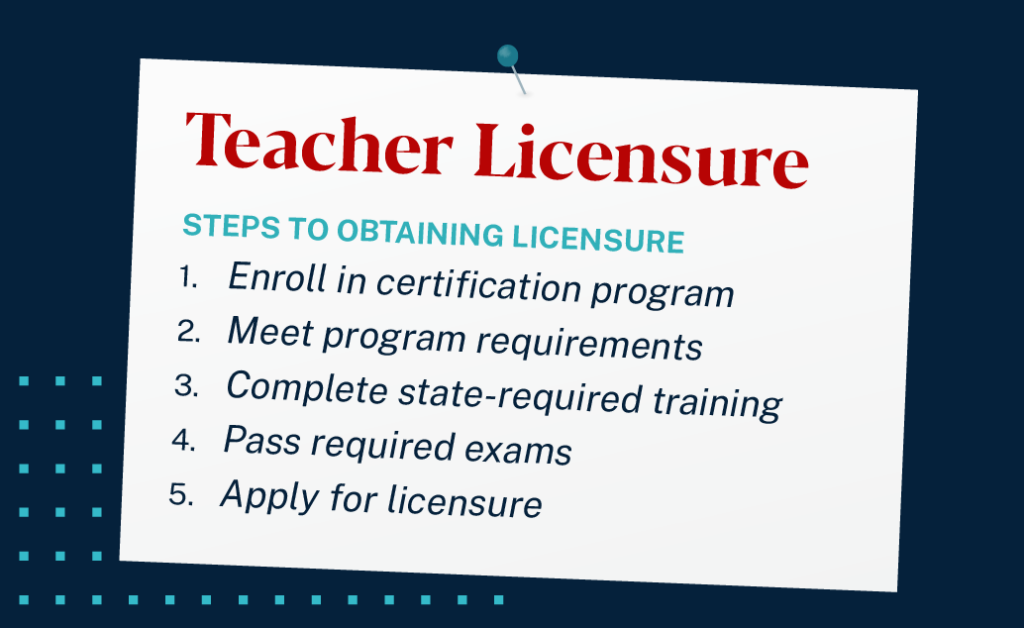
Teaching can provide a rewarding and meaningful career, filled with the promise and potential of impacting local youth. While there’s no doubt that teachers make a difference in their communities, there are as many reasons for wanting to be a teacher as there are teachers.
Some people are interested in a particular grade or age group, such as elementary education, while others are keenly interested in particular subject areas taught in secondary schools, such as math, history or foreign languages. Others may be interested in career and technical education, while some may pursue special education.
In all states, working in a public school requires a teaching license, which is a credential issued by a state indicating that the holder possesses the basic skills and competencies needed to be a teacher and is capable of being hired.
Some people know they want to be a teacher from an early age, while others make the decision later in life. Regardless of the starting point, there’s a pathway for everyone to become a licensed teacher.
Traditional teacher preparation programs include the earning of a bachelor’s degree. For those who already hold a bachelor’s degree, alternative certification programs may provide a streamlined pathway to licensure.
What Is Teacher Licensure?
All state departments of education require teachers to earn a license or certification to work in public schools, although the rules, regulations and requirements are different for each individual state. A teaching certification (or license) is a credential issued by a state that signifies the holder has the required skills, knowledge and qualifications to be hired as a teacher.
The terms “teacher licensure” and “teacher certification” (as well as even more terms, such as teaching credential, teaching certificate, teaching license, etc.) can be used interchangeably, as all refer to the document issued by a state authorizing the holder to teach in that state. The differences in terms are simply nomenclature preferences used by different states.
Obtaining teacher licensure is important because the license is the required “ticket” to public school jobs (note, however, many charter and private schools are exempt from state licensure requirements, though they may prefer to hire teachers who are certified).
Obtaining Teacher Licensure
One uniform requirement for teacher licensure across all states is that teachers must hold a bachelor’s degree from an accredited college or university. The degree need not be in education, though it can be.
Whether or not you have a degree determines the type of program you need. There are two basic types of certification programs: traditional and alternative.
Traditional programs include earning a degree as part of the program. Alternative programs are designed for those who have already earned a degree. Sometimes, alternative programs are also called post-baccalaureate programs (or post-bacc, for short) since they are taken after degree completion.
If you have not earned a degree but have earned considerable undergraduate hours, you might also consider a bachelor’s completion program, which will enable you to finish the degree. Once the degree is earned you can then enroll in an alternative teacher certification program.
Steps To Get Your Teacher License
- Select and enroll in a teacher certification program.
- Complete the program requirements, including coursework and field experiences.
- Usually, a student-teaching experience, internship or apprenticeship is required. In many alternative programs, you start working as a teacher immediately, and your work experience counts as your student teaching or internship.
- Complete any state-required training, such as CPR, mental health awareness, suicide prevention, Opioid abuse prevention, etc. (each state has particular requirements).
- Pass required exams. Most states require a content exam and a pedagogy exam. Many states utilize Praxis exams, while other states have their own testing systems.
- Complete fingerprinting and criminal history background checks (these are often required at the beginning of the program as entry criteria).
- Apply for your teaching license by submitting your materials to your state’s department of education.
Teaching Licensure Online Programs: An Alternative Route
Teaching licensure programs can be delivered through face-to-face, hybrid or online modalities, with all options having pros and cons. More and more programs are moving online, however, and they provide particular benefits.
Online programs can be especially suitable for busy adults, as the courses are often delivered asynchronously, providing maximum flexibility. In these programs, coursework can be completed anytime day or night, with no need to set aside specific blocks of time to attend classes. Also, with an online program, there’s no reason to relocate and commute, which is especially beneficial for those considering a transition to teaching from another career.
Just like face-to-face programs, online programs can be accredited and approved by states, and are comparable in quality. Many online programs are more affordable because the schools don’t have to maintain physical infrastructure and facilities and can pass that savings on to you.
State-Specific Teaching Licensure Requirements
Each state has unique licensure requirements, so checking with the state department of education for your state and reviewing the specific requirements is critical.
Some teacher preparation programs are approved by states, while other teacher preparation programs operate as “out-of-state” programs. Both options can prepare prospective teachers for the certification needed.
Many institutions maintain comprehensive databases of the certification requirements for each state, such as this professional licensure database. The institution can help you understand the requirements, but ultimately, it’s your responsibility to ensure all requirements are met.
Alternative Teacher Certification Programs
Alternative teacher certification programs are designed for individuals who already hold a bachelor’s degree. These programs are built around an abbreviated pathway of coursework and training designed to prepare prospective teachers. While many alternative programs can be completed online, many others may be conducted face-to-face by colleges, universities and other agencies.
While a bachelor’s degree is required for an alternative program, it need not be a degree in education.
Alternative certification programs are built on the premise that content knowledge is demonstrated with the underlying bachelor’s degree.
The program provides the training in pedagogy, educational psychology and child development needed to be successful as a teacher (such as lesson planning, classroom management strategies, and understanding the developmental needs of certain age groups), as well as the ethical and legal requirements of teaching as a profession.
Alternative programs are ideal for people interested in changing careers. For example, a retired chemical engineer who wants to teach high school chemistry would be an ideal candidate for an alternative program.
FAQs About Teacher Licensure
How long does it take to get a teaching license?
The time it takes to earn a teaching license depends entirely on where an individual is in the process. For those who don’t yet have a bachelor’s degree, the timeline is much longer than it is for those who have already earned a degree. With many alternative certification programs, teaching may begin in just a few weeks and the program is completed over the first year of teaching.
Can I teach without a teaching license?
Possibly. Many private schools and charter schools do not require a state-issued teaching license. These schools may, however, give preference to licensed teaching candidates.
Are online teacher licensure programs accredited?
Accreditation may vary by program. Accreditation does not depend on program format (online, face-to-face, or hybrid). Each state has its own accreditation process for reviewing and approving teacher preparation programs. Programs approved in a state can usually be found on the state’s department of education website. Additionally, external agencies, such as the Council for the Accreditation of Educator Preparation (CAEP) and the Association for Advancing Quality in Educator Preparation (AAQEP) may accredit programs, indicating an additional assurance of quality.

